2025 U.S. Proxy Season: Midseason Review Finds Sharp Drop in Shareholder Resolutions on Ballot

As May 22 is the peak of the U.S. proxy season, with 137 Russell 3000 companies expected to hold annual meetings today, ISS-Corporate has examined early trends in shareholder proposals and executive compensation. The shareholder proposal landscape has drastically changed this proxy season – notably, the total number of proposals submitted and voted on has decreased drastically while the number of proposals omitted has risen. Governance proposals remain common, although their focus has shifted. While fewer environmental and social proposals have made the ballot, those related to greenhouse gas (GHG) emissions remain popular. This analysis reviews Russell 3000 companies with annual meetings between January 1 through June 30 for each year since 2021.
Key Takeaways
- Total shareholder proposal submissions have dropped while the number of omitted proposals has increased sharply.
- Governance-related resolutions remain the most common type on the ballot.
- Despite a significant decline in environmental proposals being voted on, resolutions related to GHG emissions, generally requesting enhanced disclosure, remain common.
- Median CEO pay is at an all-time high for both S&P 500 and Russell 3000 companies.
Say-on-Pay support levels have declined slightly. While overall support remains strong, there are signs of trouble ahead.
Shareholder Proposal Submissions, Omitted, Withdrawals
Following a notable increase in proposal submissions in 2022, the total volume decreased significantly, driven by a sharp decline in proposals related to environmental- or social-related issues. The limited success of such proposals in recent years, improvements in corporate disclosure, and increased political pushback contributed to the drop in submissions.
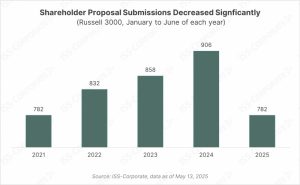
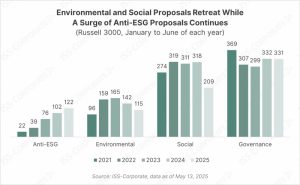
Omitted proposals have increased dramatically to about 25%, likely as a result of the SEC’s Staff Legal Bulletin No. 14M (CF), which places the onus on proponents to demonstrate that the issue at hand is significant and economically relevant to the company.
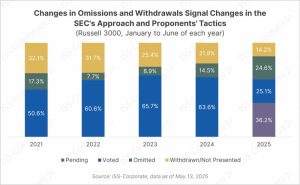
Top Shareholder Proposals on the Ballot
Governance-related requests continue to be the most prevalent type of shareholder proposal expected to go to a vote, although there has been a shift in focus. Notably, there are significantly more resolutions requesting companies to adopt a special meeting right or amend existing threshold. The average support for these proposals so far is 40%, compared to 42% last year. Support levels largely depend on a company’s existing governance practice; issuers that either lack this shareholder right or have a high threshold (greater than 25%) tend to receive strong support.
Despite the significant decline in environmental proposals going to a vote, resolutions related to GHG emissions remain a top proposal on ballot. The majority of these request enhanced disclosure, primarily asking companies to report on GHG emissions, publish a climate transition plan, or disclose the progress on established GHG emission reduction strategies.
On the social side, shareholder proposals related to lobbying and political contributions, traditionally high in volume, decreased to 8 and 14, respectively, compared to 21 and 23 last year. This is due in part to a spike in omitted proposals, with 20 proposals on lobbying and political contributions omitted from the ballot in the first half of 2025 compared to just three such proposals omitted during the same period in 2024.
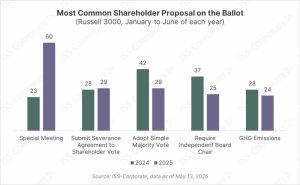
Majority-Supported Shareholder Proposals
To date, 25 shareholder proposals have received majority support this year. Three proposals related to political contributions received majority support, compared with only one proposal last year. The remaining resolutions that received above 50% of votes cast are related to governance issues, namely adopting a simple majority vote, declassifying the board, and adopting/amending special meeting rights.
Shareholder Proposals on the Ballot
Despite the drop in overall submissions, the number of companies with a shareholder proposal on the ballot has only moderately declined. Proponents continue to target the same companies. A significant percentage (79%) of Russell 3000 companies that had a shareholder resolution on the ballot this year have also had a shareholder resolution go to a vote in the past five years.
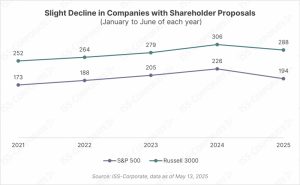
Consistent with prior years, nearly 8 in 10 issuers have only one shareholder proposal on the ballot. However, fewer companies have multiple resolutions on the ballot. The number of companies receiving five or more proposals has dropped significantly from nearly two dozen such cases in 2024 to just 10 in 2025.
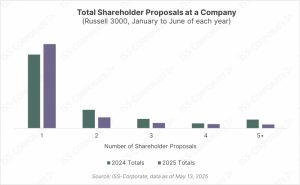
Top 5 companies with the most shareholder proposals on the ballot:

Median CEO pay climbed to an all-time high for both S&P 500 and Russell 3000 companies. The S&P 500 median rose to $17 million from $15.7 million last year and Russell 3000 CEOs saw a gain to $7.2 million from $6.6 million last year. An increase in total target pay and strong total shareholder returns have contributed to the increase in CEO pay.
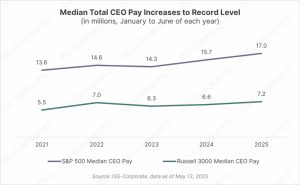
Say-on-Pay support levels have declined slightly, although overall support remains strong. The dip could be attributed to the resurgence of one-time awards and mid-cycle adjustments, which were prevalent following the COVID pandemic but became less common in 2023 and 2024. Looking ahead, stock market volatility and a rapidly changing economic landscape may necessitate deviations from regular compensation programs and support may drop further in 2026.
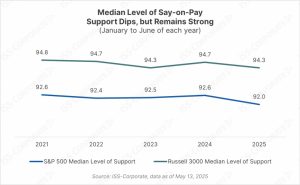
The shareholder landscape has experienced a notable shift in volume and topics. Looking ahead, ISS-Corporate is monitoring trends in vote outcomes, as well as additional updates from the SEC.
Executive Compensation Goal Setting: Putting Together Your Best Toolkit
2025 U.S. Proxy Season: Midseason Review Finds Sharp Drop in Shareholder Resolutions on Ballot
U.S. CEO Compensation Advantage Grows vs. U.K. Peers
For Corporate Boards, Cyber Risk is ESG Risk
Feet on the Accelerator: Fewer Companies Willing to Relinquish Power to Advance Equity Vesting
SEC Adopts Final Rules on Pay versus Performance Disclosures
New Approach to SEC Rule 14a-8: What It Means for Companies
Governance, Risk & Resilience: Key Takeaways from London
Overstaying Their Welcome? A Close Look at Independent Directors Tenure in Hong Kong
Too Many Hats: Hong Kong Companies Pressed to Cut Down on “Overboarding”

